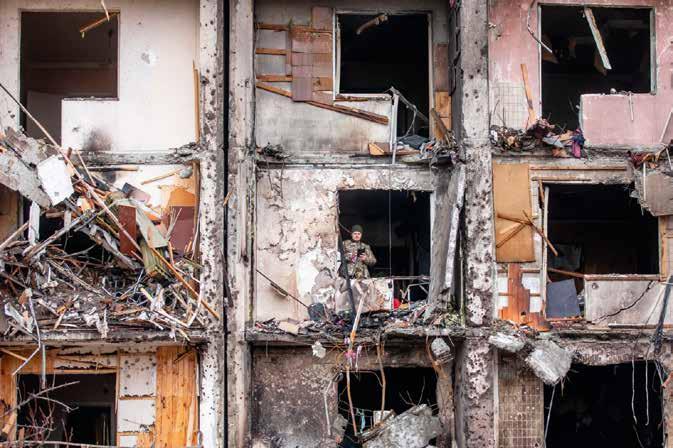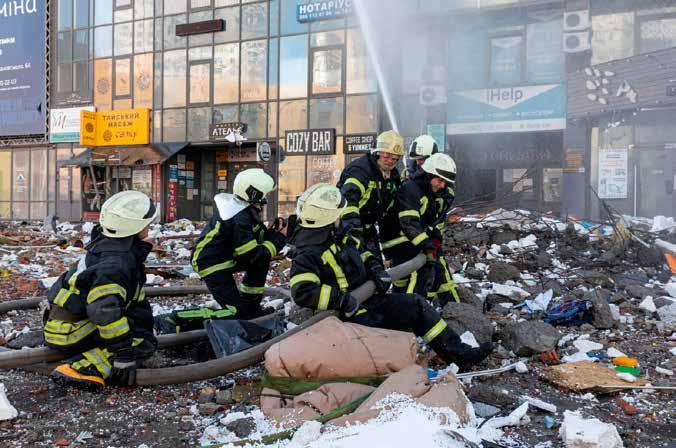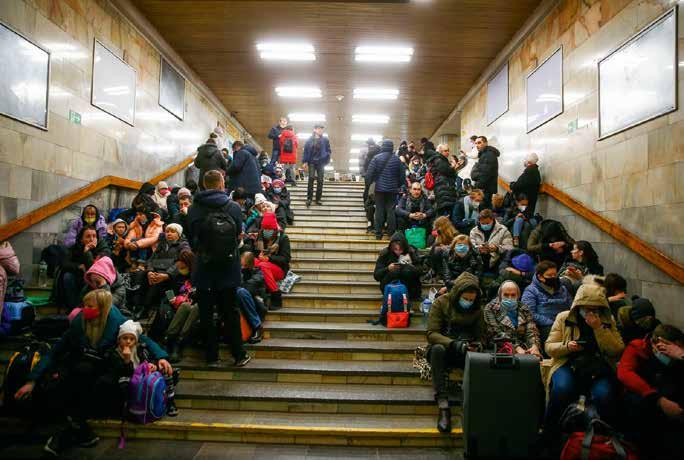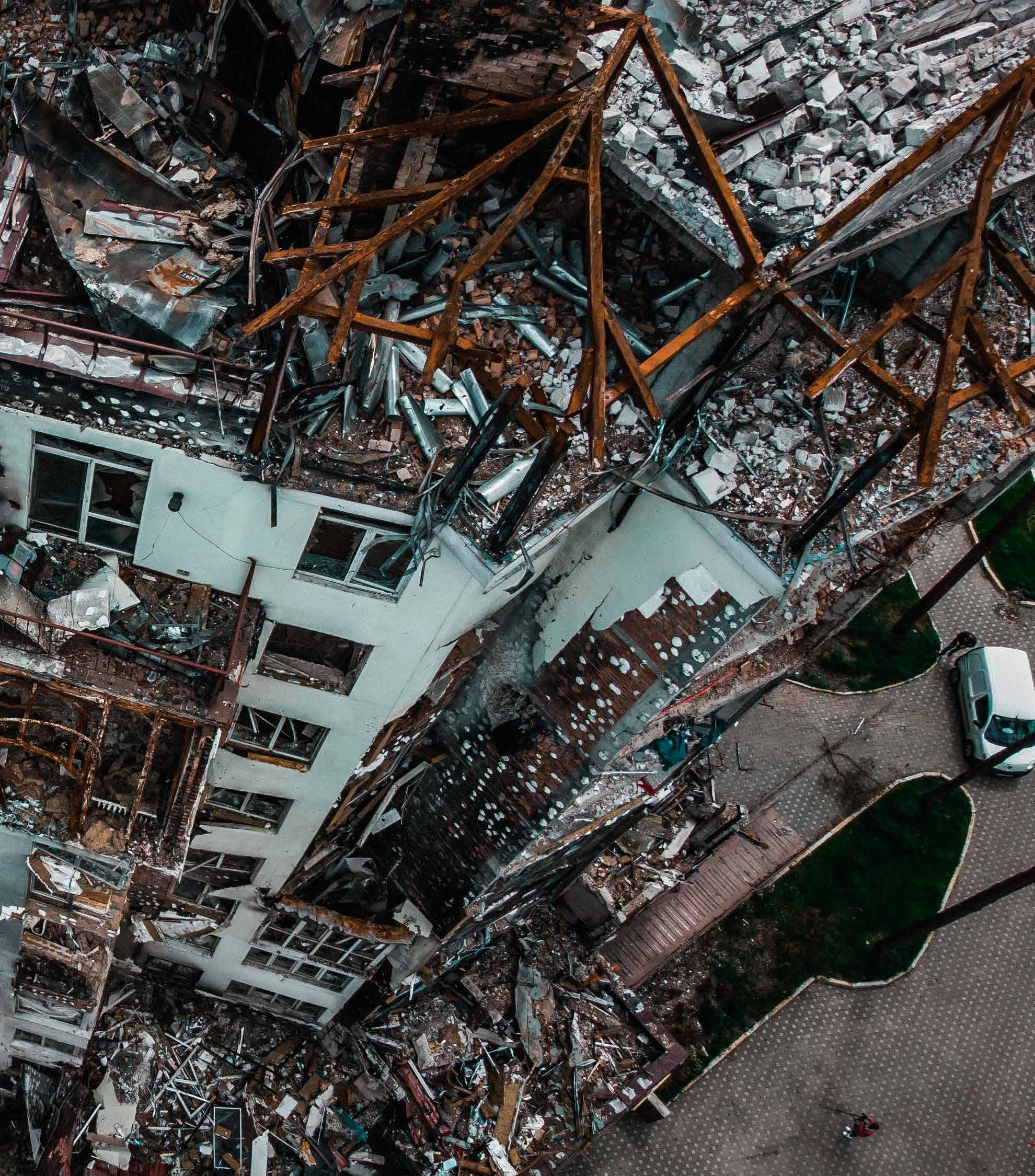
6 minute read
Science: A Casualty of War

As Russian tanks rolled into Ukrainian villages, scientists and research funding organisations from around the world withdrew from collaborations and partnerships with Russia on major science projects.
International scientists did not for the first time in 22 years make their annual trip to the Northwest Science Station in Siberia to study ongoing climate change in the Arctic environment. Funding was withdrawn by the Max Planck Institute in Germany to those manning the station to check how quickly climate change was thawing the permafrost and how much methane was being released into the atmosphere. With Russian relations in tatters, access to the Arctic will be more challenging altogether for international teams, as Russia claims more than half of the land and sea of the Arctic coastline. This will mean in turn, a loss of understanding of a key aspect of how climate change is unravelling.
By Richard Forsyth

Reuters also reported a halt to funding for high tech research facilities in Russia such as an ion collider and a neutron reactor as Europe was set to invest some 25 million euros.
Germany in particular, has engaged in a great deal of scientific research in partnership with Russia. For instance, the research organisation, the Helmholtz Association (HGF), hosted 362 Russian guest researchers in 2019 alone. Freezing out Russia in collaboration, funding and exchange will leave a gaping hole in a vast array of research projects.
It was Germany however, that was clear it would sever all links with the Russian scientific community from the beginning of the conflict, whilst not every country wanted to follow suit so quickly. Just after the invasion began, the Belgian Reactor’s Conference appealed that academic cooperation should continue as much as possible during the conflict.

Complete breakdown of collaboration
There is a fear that science itself and indeed Russian scientists, not complicit in the war, will suffer from the consequences of this conflict.
For that reason, many collaborators from Europe and Russia who have been working together on projects are less eager to break off relationships with their counterparts over what’s seen as a situation purely driven by the Russian state and beyond their control.
A climate of fear imposed on free speech by Moscow has also meant it’s harder for Russian scientists to protest, despite early efforts. A letter was signed by 2,500 staff and students in the Moscow Institute of Physics and Technology stating they ‘could not support this senseless and outrageous war’ but it was deleted quickly when a new law meant that a prison term of 15 years could be handed out to people discrediting the Russian military. As it’s well known now, Russia refuses to call the situation a ‘war’, instead, it labels it a ‘special military operation’ and those who use the term ‘invasion’ or ‘war’ can be jailed, for sentences that would be more suited to serious violent crimes.
It appears that any kind of backlash against the government line is punished. The clampdown on dissent by Russia’s ministry of justice has blocked the website for the Russian science newspaper Troitsky Variant after a letter was published by the publication with 8,000 signatures from scientists and science journalists opposing the invasion of Ukraine.



In the UK, The Guardian newspaper reported that many Russian scientists are trying to leave Russia, as it is widely perceived there is no future for science in Russia. The paper quoted Moscow physicist Dr Alexander Nozik, who said poignantly, “I believe and most of my colleagues believe that it just isn’t possible to do isolated science. In physics, the science journal system in Russia is mostly dead.”
To exasperate the climate of research in Russia, university salaries have been reported to be slashed in the deepening economic crisis in the country.
At the famous particle physics laboratory, CERN, Russia was suspended from official ‘observer’ status but the organisation did stand by Russian scientists working there. Indeed, it’s the big international projects where science gets the roughest ride from the implications of this conflict. ITER, the French fusion reactor project, to create the sun’s energy on Earth, is another example, as it is part-funded by Russia. ITER has been slow to respond because of this, and there is a lot at stake for the future of the world’s sustainable energy needs. They are trying to work out how to manage the situation without jeopardising so much progress on an energy project that could be essential to Mankind’s future needs.

Values mean more than research
It’s worth realising that Ukraine’s scientists are also largely out of action, not because of isolation or lack of funds but because many researchers are either fleeing or fighting. Men of fighting age and many women too, have ditched research and university pursuits to defend their country. It’s been reported that at least one scientist, physicist Vasyl Kladko, has been shot dead by Russian soldiers. The science institutions are not spared the Russian bombardments, for instance, the Kharkiv Institute of Physics and Technology has been badly damaged in attacks. Another example of impossible conditions was when the science team working at Enamine Ltd, a key player in global drug research, had to abandon their work on a project around a pill for Covid treatment, as their lab was near the frontlines. The blunt hammer of war destroys so many futures in so many different ways, both directly and indirectly, and the simple truth is it is impossible to do science under fire and with the constant threat of death.
Principles, projects and allegiances in science around the world are being tested by Russia’s brutal invasion of Ukraine, and the ripples of the barbaric act will travel deep into our future. Widely speaking, the West’s mood music is playing the same tune. In a display of solidarity with Ukraine, the EU Commission suspended all cooperation with Russian research entities, which included stopping new contracts in their tracks and suspending payments on existing contracts. It is a comprehensive, unified stance with a sweeping impact.
Margrethe Vestager, Executive Vice-President for a Europe fit for the Digital Age, summed it up succinctly by saying: “EU research cooperation is based on the respect for the freedoms and rights that underpin excellence and innovation. Russia’s heinous military aggression against Ukraine is an attack against those same values. It is, therefore, time to put an end to our research cooperation with Russia”.
No space for aggressors
The conflict is not just affecting Earthly scientific pursuits. Space science has always been one of the greatest endeavours embracing strong collaborations of resources and teams between Russia, the USA and Europe especially. The invasion of Ukraine has dropped all this work into freefall.
The European Space Agency (ESA) stopped its work with Russia on the ExoMars mission which meant postponing the launch of the rover which was supposed to take place in September. On 13 April ESA announced it was also cutting ties with Roscosmos on planned lunar missions such as the Luna-25 and Luna-27 lander and the Luna-26 orbiter.

An ESA statement confirmed: “…the Russian aggression against Ukraine and the resulting sanctions put in place represent a fundamental change of circumstances and make it impossible for ESA to implement the planned lunar cooperation.”
The International Space Station is affected, and Russia has announced it will pull out of the ISS in relation to the tensions and more precisely the sanctions imposed on Russia relating to the Ukraine conflict. NASA’s reliance on Russian Soyuz spacecraft for transporting astronauts will come to an end as private space companies like SpaceX will be expected to facilitate this need, and this is an interesting development because, like so many of the big collaborations, it has far-reaching implications for a changed world scape, a new socio-economic shift for the globe. Russia may well become to the West a place akin to North Korea, an untouchable land, isolated, unfriendly and with no ties or cooperative relationships.

Unlike North Korea, Russia is the biggest country on Earth and one Europe and the US are used to dealing with and relying on, despite differences.
Russia has not been completely scientifically isolated by the world and still has links to China, India and South Africa, despite appeals from these countries to resolve the war but the severed links and support from the West are having and will continue to have a long-term damaging effect for science in Russia and in general, as we draw a new red line between countries and their institutions.
What we are seeing in science is what we are seeing in sectors like energy, with gas and oil to Europe being sourced elsewhere than Russia, in addition to the ratcheting up of reliance on forward-thinking solutions, like increasing renewables. In the same way, there is an urgent need to bolster and increase alliances and shared resources with countries onside or at very least, neutral, to this conflict. We will see an uncomfortable shuffling around of resources, supply chains, scientists and also exciting new partnerships endeavouring to replace Russian based research and Russian relationships.
Inevitably, in a vast array of research, science will stall, but for many of these key projects, there will simply be adaption. The strength of European relationships is noticeably more connected and robust since the war began, and the redoubled relationships around Europe and other countries around the world could potentially, at least, promote a new era of cooperation for these researchers, as we move into a very different, if more challenging, geopolitical age.










